CNN
—
Chief Justice John Roberts has been outmatched by President Donald Trump in the fight over the administration’s wrongful deportation of a Maryland man to El Salvador.
No matter how much the right-wing justices wanted to balance deference for the executive branch with the effort to free Kilmar Abrego Garcia, they now appear ineffectual. The White House has rendered the Supreme Court’s order in the case completely hollow, insisting it won 9-0 and need do nothing to bring Abrego Garcia back from a notoriously brutal Salvadoran prison.
The Trump team read the Supreme Court’s order in the stingiest terms possible, acting with a degree of bad faith that the justices may not have anticipated.
Still, Roberts and the Supreme Court majority partly set the country on this course with their short, opaque order that said the government should “facilitate,” not “effectuate,” his release.
At the same time, the justices emphasized in last Thursday’s order “due regard for the deference owed” the executive in foreign affairs.
Unlike lower court judges who had previously handled the Abrego Garcia case, the Roberts majority expressed no outrage at the administration’s mistake. They failed even to latch onto the language of a fellow conservative, US appellate Judge J. Harvie Wilkinson.
“There is no question that the government screwed up here,” Wilkinson wrote.
Wilkinson, an appointee of President Ronald Reagan, similarly said that the administration must “facilitate” Abrego Garcia’s return, rather than “effectuate,” that is, ensure it happens. (US District Court Judge Paula Xinis had earlier ordered the government to “facilitate and effectuate” his return by 11:59 pm April 7.)
But where the Supreme Court employed no rhetorical muscle in its decision upholding a portion of the Xinis order, Wilkinson warned of what could happen if the Trump team remained recalcitrant.
“The facts of this case thus present the potential for a disturbing loophole: namely that the government could whisk individuals to foreign prisons in violation of court orders and then contend, invoking its Article II powers, that it is no longer their custodian, and there is nothing that can be done,” Wilkinson wrote. “It takes no small amount of imagination to understand that this is a path of perfect lawlessness, one that courts cannot condone.”
What might have been imagined is now reality.
Echoing their assertions in court filings, Trump officials on Monday in the White House claimed they have neither the power nor responsibility to retrieve Abrego Garcia.
“That’s up to El Salvador if they want to return him,” Attorney General Pam Bondi said. “That’s not up to us. The Supreme Court ruled that if El Salvador wants to return him … we would facilitate it: meaning, provide a plane.”
White House advisor Stephen Miller added in that Oval Office meeting Monday between Trump and Salvadoran President Nayib Bukele, “It was 9-0, in our favor, against the district court ruling, saying no district court has the power to compel the foreign policy function of the United States.”
For his part, Bukele said he would not be releasing Abrego Garcia.
The order from the Supreme Court was unsigned. If Roberts and his fellow justices hoped for a different reading of their decision, they miscalculated. (Alternatively, they could be completely satisfied.)
In the public eye, however, Trump officials have scorned the Roberts Court decision. And Abrego Garcia remains in prison.
As liberal Justice Sonia Sotomayor observed as she wrote separately last week, “the Government has cited no basis in law for Abrego Garcia’s warrantless arrest, his removal to El Salvador, or his confinement in a Salvadoran prison. … where he has been detained for 26 days and counting.”
It has now been 31 days.
Since Trump first won election in 2016, he and Roberts have often squared off, in cases and beyond the bench.
One notable clash occurred just last month after Trump referred to a federal judge handling a separate migrant deportation case as “crooked” and declared in a social media post that the judge “should be IMPEACHED.”
Roberts, who for weeks had declined to respond to Trump administration rants against the judiciary, issued a statement that said, “For more than two centuries, it has been established that impeachment is not an appropriate response to disagreement concerning a judicial decision. The normal appellate review process exists for that purpose.”
Roberts, the 17th chief justice of the United States, obviously has a more measured style than the 47th president. As he writes his opinions, Roberts seems unconcerned about scoring rhetorical points against the administration.
Yet, as a fervent proponent of executive branch authority, Roberts has often sided with Trump. Earlier this month, he and four fellow conservatives let Trump speed up deportations with enforcement of the Alien Enemies Act, a 1798 law that had previously been used only in wartime.
The decision did require a safeguard. The court said that for future cases people who face deportation should receive notice that they are subject to the Act and be able to contest the deportation before a US judge in the district where they’re being held.

U.S. Chief Justice John Roberts rebukes calls to impeach judges
Roberts appears to be trying to move slowly and avoid confrontation with Trump. Certainly, the administration’s attitudes toward the judiciary have foreshadowed a constitutional breakdown and eventual defiance of a Supreme Court order.
As other institutions have discovered since January 20, the day Roberts read Trump the oath for his second presidency, Trump has sought total control. He appears ready for combat.
It is understandable that any jurist would seek a relationship that is more collaborative than combative.
But based on Trump’s disregard for federal judges, and the current rejection of any relief for a mistakenly deported man, Roberts may soon recognize that the judiciary has been met with neither collaboration nor respect.

